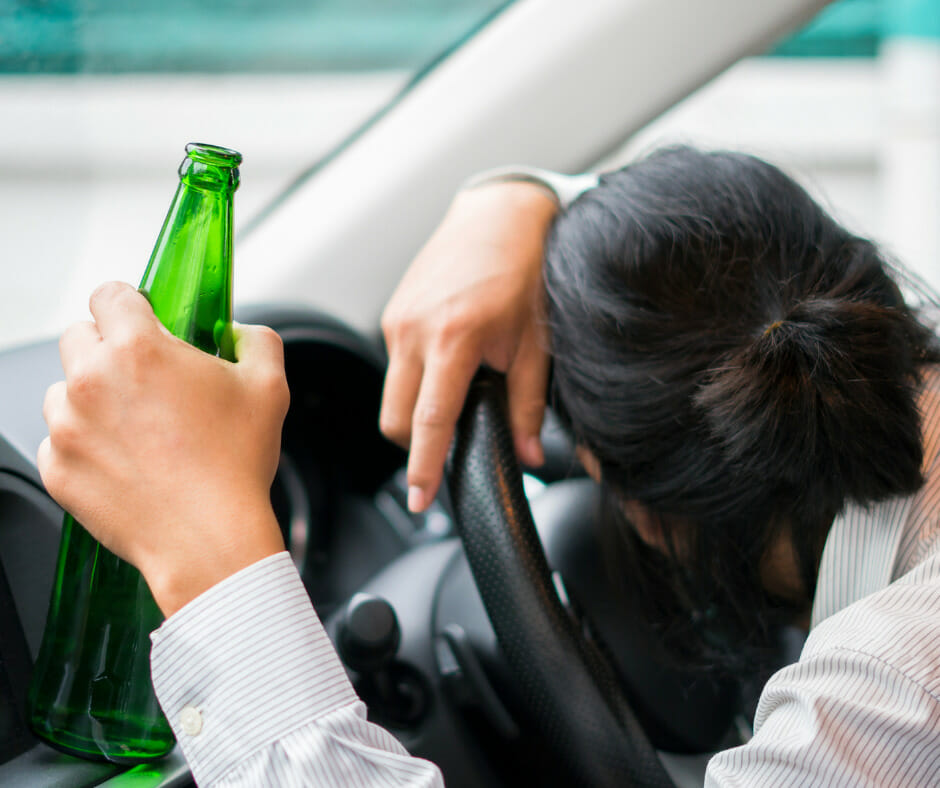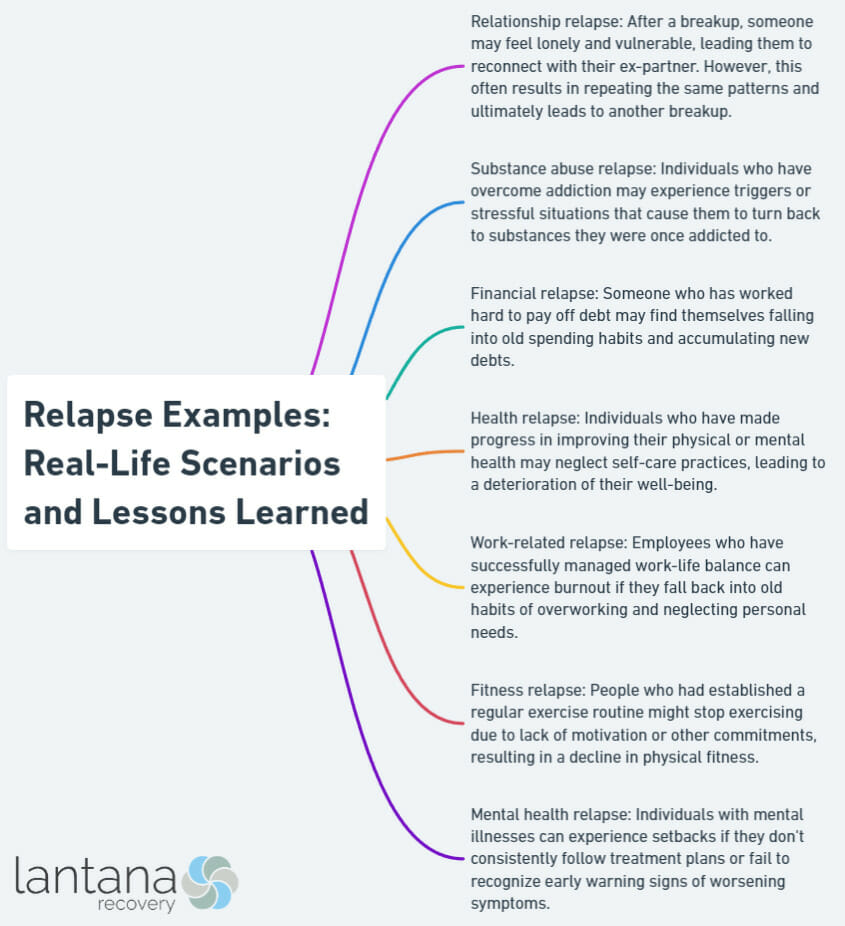Relapse is a common and challenging experience for individuals recovering from addiction. Understanding the factors that contribute to relapse and learning from real-life scenarios can provide valuable insights and lessons for those on the path to recovery. In this article, we will explore various aspects of relapse, including common triggers and warning signs, as well as strategies to prevent and seek help after a relapse.
Relapse refers to a return to substance abuse or addictive behaviors after a period of abstinence or recovery. It is a multifaceted process that can be influenced by various factors, both internal and external. Recognizing and addressing these triggers is crucial in maintaining long-term recovery.
Common triggers for relapse include emotional, environmental, and social factors. Emotional triggers may include stress, anxiety, depression, or even positive emotions such as excitement or celebration. Environmental triggers can range from being in a particular location associated with substance use to encountering objects or situations that remind an individual of their past addictive behaviors. Social triggers involve interactions with certain individuals, peer pressure, or feeling isolated or disconnected from social support systems.
To illustrate the complexities of relapse, we will explore real-life scenarios that exemplify different triggers. Lastly, we will examine a scenario where overconfidence becomes a trigger for relapse, emphasizing the need for continued self-awareness and humility in recovery. Each scenario provides valuable lessons for understanding and navigating the challenges of recovery.
In addition to identifying triggers, it is essential to be aware of warning signs that may indicate an impending relapse. Physical warning signs can include changes in appetite, sleep patterns, or fluctuations in energy levels. Emotional warning signs may involve increased irritability, mood swings, or a decline in mental well-being. Recognizing and addressing these warning signs in a timely manner can prevent a full relapse.
To prevent relapse, developing a supportive network is crucial. Surrounding oneself with individuals who are understanding, non-judgmental, and supportive of the recovery journey can provide the necessary encouragement and accountability. It is also important to develop coping strategies that help manage stress, cravings, and other challenges that may arise. Addressing underlying issues such as trauma, co-occurring mental health disorders, or unresolved emotional issues is essential for long-term recovery. Finally, if a relapse does occur, seeking help is crucial.
Reaching out to support groups, such as 12-step programs or therapy groups, can offer guidance, understanding, and connection with others who have experienced similar challenges. Therapy and counseling options, both individual and group-based, can provide personalized strategies and support to address underlying issues and prevent future relapses. By understanding relapse, its triggers, warning signs, and strategies for prevention and seeking help, individuals can navigate the complexities of the recovery journey with greater resilience and success.

Understanding Relapse
Understanding relapse is crucial to prevent and effectively address it. Relapse refers to a return to substance use or addictive behavior after a period of abstinence or improvement. Relapse is not a sign of failure or weakness. It is a complex process influenced by various factors such as biology, psychology, and the environment. Recognizing warning signs is crucial to prevent relapse. These signs may include cravings, negative emotions, isolation, increased stress, or a decline in self-care.
It is highly recommended to have a relapse prevention plan. This plan should include coping strategies for triggers, developing healthy coping mechanisms, and seeking support from peers, therapists, or support groups. Relapse should serve as an opportunity for growth and learning. Understanding the factors that contributed to the relapse and adjusting the recovery plan accordingly is important. Building a strong support system with loved ones is essential. They can provide accountability, encouragement, and understanding during the recovery journey. Seek professional help when needed. Addiction is a complex disease, and guidance from addiction specialists or therapists can greatly enhance long-term recovery chances.
By understanding relapse and taking proactive measures, individuals can increase resilience and improve their chances of maintaining long-term sobriety and well-being.
Common Triggers for Relapse
Navigate the treacherous terrain of relapse as we dive into the realm of common triggers. “Addiction has become one of the most critical health care challenges presently facing the American health care system” (Why Addiction Has a Chronic, Relapsing Course. The Neurobiology of Addiction, Gutman, 2005.) Brace yourself for an exploration of emotional, environmental, and social triggers that can push us toward a setback. Uncover the hidden forces that sabotage our progress and discover lessons learned from real-life scenarios. Prepare to be enlightened and equipped with invaluable insights to better navigate the challenging journey of recovery.

Emotional Triggers
Emotional triggers are a crucial factor when it comes to relapse. It is important to acknowledge and deal with these triggers in order to avoid setbacks in the recovery process. Here are a few key points to consider when facing emotional triggers:
1. Take note of your personal emotions: Recognize the emotions that may lead to cravings or harmful behaviors, such as anger, sadness, loneliness, or frustration.
2. Understand the connection: Gain an understanding of how these emotions are connected to the desire to relapse. For instance, feeling stressed may trigger the urge to turn to substances as a way of coping.
3. Foster emotional resilience: Develop healthy coping strategies to manage your emotions. Engage in activities like exercise, mindfulness, or confiding in a trusted friend or therapist to cultivate emotional resilience.
4. Create a supportive environment: Surround yourself with individuals who are supportive and understanding of your recovery journey. This network can provide encouragement during challenging times.
5. Prioritize self-care: Take care of your physical and emotional well-being. Make sure to get enough sleep, maintain a balanced diet, participate in joyful hobbies or activities, and show self-compassion.
6. Seek professional assistance: If emotional triggers become overwhelming, reach out to a counselor, therapist, or addiction specialist. They can offer personalized guidance and support.
By recognizing and addressing emotional triggers, individuals in recovery can strengthen their resilience and reduce the risk of relapse. Remember, the path to recovery is a journey, and seeking professional help from experts in addiction rehab, and developing healthy coping strategies are essential components of this process.
Environmental Triggers
Environmental triggers are highly influential in causing a relapse. Hannah Pickard’s paper The Purpose in Chronic Addiction states that using drugs and alcohol is seen as a voluntary way to achieve certain goals, guided by strong habits, determination, motivation, functional purposes, and conscious decision-making, rather than being driven by compulsive behavior. These triggers encompass external factors that can result in a recurrence of addictive behaviors. To effectively prevent relapse, it is crucial to be fully aware of these triggers. Here are several examples of such triggers:
1. Substance presence: Being within an environment where drugs or alcohol are easily accessible can act as a trigger for individuals in the process of recovering from addiction. Witnessing others using substances or being present in locations associated with substance use can generate cravings and temptations.
2. Social gatherings: Parties or gatherings where substance use is prevalent can serve as triggers for individuals in the recovery phase. In these situations, memories of past substance use can resurface, making it challenging to resist the temptation to use again.
3. Stressful situations: High levels of stress can act as triggers for relapse. Stressful events such as financial difficulties, relationship problems, or work-related stress can increase vulnerability and lead to the use of substances as a coping mechanism.
4. Enablers: Being surrounded by individuals who enable or encourage substance use can impede the recovery process. These individuals may exert pressure or normalize substance use, making it difficult to maintain sobriety.
5. Lack of support: An unsupportive or unsympathetic environment can trigger a relapse. Establishing a strong support system, which includes friends, family, and support groups, is crucial in combating environmental triggers.
Understanding and pinpointing environmental triggers is crucial for individuals in recovery. By acknowledging these triggers, individuals can develop effective strategies to avoid or cope with them, ultimately helping to prevent relapse and sustain long-term sobriety.
Social Triggers
Social triggers, such as peer pressure, social events, stressful situations, and lack of support, often lead to relapse in individuals with addiction. It is vital to be aware of and avoid these triggers. Here are some common social triggers that individuals should be mindful of:
-
Peer pressure: It is important to carefully choose your social circle and distance yourself from friends or acquaintances who abuse substances. Surrounding yourself with people who encourage or enable your addiction can greatly influence your behavior.
-
Social events: Parties or gatherings where alcohol or drugs are present can be challenging for individuals in recovery. To overcome this, it is helpful to have a plan in place. This plan may include attending support group meetings before or after the event, bringing a sober buddy with you, or simply avoiding such events in early recovery.
-
Stressful situations: High levels of stress can weaken your resolve and make you more vulnerable to relapse. It is crucial to develop healthy coping mechanisms to deal with stress. This can include engaging in exercise, practicing mindfulness techniques, or seeking support from others.
-
Lack of support: Isolation and a lack of a supportive network increase the risk of relapse. It is important to surround yourself with understanding and supportive individuals who are committed to your recovery.
To minimize social triggers, it is essential to take certain steps:
-
Communicate your boundaries and needs to your friends and loved ones. Make it clear to them that you are committed to your recovery and that certain behaviors or situations are off-limits.
-
Engage in enjoyable and fulfilling activities that keep you away from triggering environments. Find hobbies or interests that bring you joy and help distract you from potential triggers.
-
If you find yourself struggling with social triggers or feeling overwhelmed by the challenges of recovery, do not hesitate to seek professional help. There are professionals who can provide guidance and support tailored to your specific needs.
By being aware of social triggers and taking proactive steps to avoid them, individuals in recovery can greatly enhance their chances of maintaining a healthy and successful lifestyle.

Real-Life Scenarios of Relapse
Relapses can be challenging, but understanding real-life scenarios can provide valuable lessons. Let’s dive into the relapse scenarios that shed light on different triggers individuals face. From the influence of peer pressure to the weight of stress and anxiety, and even the pitfalls of overconfidence, we’ll explore these relapse scenarios and the lessons learned from them. So, tighten your seatbelts as we delve into the realities of relapse and gather insights to navigate these situations with resilience.
Relapse Scenario: Peer Pressure
Why relapse is a part of recovery? Peer pressure is a relapse scenario that is often encountered during the recovery journey. It occurs when individuals are influenced and pushed by their peers to engage in behaviors they have previously overcome. Resisting peer pressure can be a difficult task, especially when the desire for acceptance and approval from a social group comes into play.
In a relapse scenario involving peer pressure, individuals in recovery may find themselves in situations where their friends or acquaintances are involved in addictive behaviors, such as drinking or drug use. The fear of missing out or the strong desire to fit in can create a very strong temptation to join in, disregarding the potential consequences.
It should be noted, however, that succumbing to peer pressure and experiencing a relapse does not define a person’s recovery journey. In order to successfully navigate through such situations, it is crucial to seek support from sponsors, therapists, or support groups. Building a supportive network of individuals who truly understand the challenges of recovery can provide the necessary encouragement and guidance during these difficult times.
True Story: Despite being in the recovery phase for several months, John found himself at a party where his old friends were pressuring him to drink alcohol. Feeling vulnerable and wanting to fit in, John gave in to the peer pressure and relapsed. However, he was able to learn from this experience and promptly sought help from his support network. This incident made him realize the importance of establishing boundaries and surrounding himself with positive influences in order to prevent future relapses triggered by peer pressure.
Relapse Scenario: Stress and Anxiety
Stress and anxiety can act as powerful triggers for relapse in individuals who are in the process of recovering from addiction. It is crucial to understand how these factors contribute to relapse and take the necessary measures to address them.
During stressful situations, individuals may feel overwhelmed and experience heightened levels of anxiety, which can create a strong urge to seek relief through substance use. However, it is important to acknowledge that stress and anxiety are inevitable aspects of life. To effectively manage them, it is essential to develop healthy coping mechanisms.
An excellent way for individuals in recovery to manage stress is to practice various stress management techniques, such as deep breathing exercises, meditation, or engaging in physical activities like yoga or running. These activities have been proven to reduce stress and anxiety levels, providing individuals with a healthier outlet for emotional release.
In addition to practicing self-help techniques, maintaining a strong support network is crucial for dealing with stress and anxiety during the recovery process. Trusted friends, family members, or support groups can offer invaluable encouragement, guidance, and a listening ear during challenging times. Seeking professional help, such as therapy or counseling, can also be highly beneficial in addressing underlying issues contributing to stress and anxiety.
By actively addressing stress and anxiety and incorporating healthy coping strategies, individuals can significantly minimize the risk of relapse. It is important to remember that recovery is a journey, and setbacks may occur. However, by staying committed to self-care, seeking support, and utilizing effective coping mechanisms, individuals can navigate through stressful situations with resilience and maintain their recovery.
Relapse Scenario: Overconfidence
A common relapse scenario during addiction recovery is overconfidence. Overconfidence means being excessively confident in one’s ability to resist addiction urges and temptations. This false sense of security can make individuals think they have overcome their addiction and no longer need to be vigilant.
In a relapse scenario due to overconfidence, individuals may:
- Ignore warning signs: Overconfidence can cause people to overlook or dismiss physical symptoms like cravings or withdrawal symptoms, as well as emotional warning signs like increased irritability or restlessness.
- Engage in high-risk situations: Overconfidence may make individuals believe they can handle situations that could trigger a relapse, such as attending parties with alcohol or drugs or spending time with friends who still abuse substances.
- Stop or reduce support systems: When people feel overly confident in their recovery, they may stop attending support group meetings or therapy sessions. They may also distance themselves from their support network, thinking they no longer need help.
True Story: After completing a rehab program for alcohol addiction, John felt confident in his sobriety. He believed he could now drink in moderation. However, this relapse scenario caused by overconfidence caused him to underestimate the power of his addiction. Within a few weeks, he relapsed, feeling devastated and hopeless. This story highlights the importance of remaining vigilant and maintaining support systems, even in times of apparent stability in recovery.
Identifying Warning Signs of Relapse
When it comes to preventing relapse, being able to identify the warning signs is crucial. In this section, we’ll dive into the telltale signs that can serve as red flags, helping you stay on track and avoid slipping back into old patterns. We’ll explore the physical warning signs that your body might be signaling, as well as the emotional indicators that could hint at a potential relapse. By recognizing these warning signs early on, you can arm yourself with the knowledge needed to maintain your progress and make informed choices.
Physical Warning Signs
Physical warning signs are crucial indicators of a potential relapse that should not be ignored. It is important to be aware of these signs in order to take prompt action and prevent a full relapse. Here are some physical warning signs that one should watch out for:
- Changes in appetite and weight: Any sudden weight loss or gain, as well as changes in appetite, can serve as a signal of emotional distress and possible relapse.
- Insomnia or sleep pattern changes: Difficulty falling asleep, staying asleep, or waking up too early can be an indication of heightened stress or anxiety, which can contribute to a relapse.
- Frequent headaches or migraines: Persistent headaches can be a manifestation of emotional distress and may require additional support.
- Increased fatigue or decreased energy: Feeling constantly tired or lacking motivation can be a sign of emotional exhaustion and can increase vulnerability to relapse.
- Stomach issues: Digestive problems such as stomachaches, nausea, or diarrhea can be caused by emotional stress and may be linked to relapse.
True Story: Sarah, a recovering addict, began to experience frequent headaches and insomnia after a stressful event at work. Unfortunately, she chose to ignore these physical warning signs and continued her life without addressing the underlying issues. Eventually, her lack of sleep, increased fatigue, and anxiety resulted in a relapse. This story highlights the critical importance of recognizing and addressing physical warning signs in order to prevent relapse.
Emotional Warning Signs
Emotional warning signs are crucial in identifying the potential for relapse. Here are some key emotional warning signs to be vigilant about:
- A noticeable increase in irritability or anger: Feeling easily provoked or prone to anger could be an indication of emotional strain and a heightened risk of relapse. It is important to acknowledge these emotions and address them in a healthy manner.
- Overwhelming feelings of anxiety or being constantly on edge: Stress or anxiety can contribute to vulnerability for relapse. It is important to pay attention to our stress levels and practice techniques that reduce stress.
- Persistent feelings of depression or sadness: Sustained feelings of sadness or loss of interest in activities may indicate emotional instability. Reaching out to a support system or seeking professional help can help address these emotions and prevent relapse.
- Engaging in isolation or withdrawal: Retreating from social activities or distancing ourselves from loved ones can be a sign of emotional struggles. It is important to maintain connections with supportive individuals and seek assistance if necessary.
- Difficulty in effectively dealing with emotions: If everyday emotions become overwhelming and unhealthy coping mechanisms are employed, it is advisable to seek healthier alternatives. Exploring strategies like exercise, journaling, or talking to a therapist can significantly help in coping with emotions.
Paying careful attention to these emotional warning signs is vital as they serve as early indicators of potential relapse. By acknowledging and addressing these emotions, individuals can take proactive steps to sustain their recovery journey and prevent relapse.

Preventing Relapse
Preventing relapse is crucial in maintaining sobriety and navigating the challenges of recovery. In this section, we’ll discover effective strategies that can help individuals stay on track and avoid setbacks. We’ll explore the importance of creating a supportive network, developing coping mechanisms, and addressing underlying issues. By understanding these key aspects, individuals can gain valuable insights and tools to strengthen their resilience and make lasting progress in their journey toward recovery.
Create a Supportive Network
To prevent relapse, it’s crucial to create a supportive network that can provide assistance and encouragement. This network can include individuals or groups who understand the challenges of recovery. Here are some steps to create a supportive network:
1. Seek individuals who have overcome addiction and are now living a sober life: Their experience and wisdom can provide valuable guidance and support.
2. Join support groups like Alcoholics Anonymous or Narcotics Anonymous: These groups allow you to connect with others facing similar struggles and provide a safe space to share experiences and seek advice.
3. Get support from committed friends and family members: Their love and encouragement are vital in helping you stay on track.
4. Consider professional counseling or therapy: A trained therapist from Lantana Recovery in Greenville, for example, can offer guidance, help you navigate challenges, and provide emotional support throughout your recovery journey.
5. Stay connected with your support network regularly, whether through in-person meetings, phone calls, or online platforms: Regular communication with understanding individuals can strengthen your commitment to sobriety.
Develop Coping Strategies
Developing coping strategies is crucial in order to prevent relapse and maintain sobriety. By implementing these strategies, individuals can effectively manage cravings, stress, and triggers. Here are the necessary steps to develop effective coping strategies:
1. Identify triggers: It is important to recognize and understand specific situations, emotions, or individuals that can trigger cravings or negative emotions.
2. Learn healthy ways to cope: Take the time to explore various activities such as exercise, meditation, deep breathing, journaling, hobbies, and other fulfilling endeavors.
3. Build a support network: Surround yourself with a strong support system consisting of friends, family, or support groups who can offer encouragement, understanding, and accountability.
4. Practice self-care: Prioritize activities that promote relaxation and reduce stress, along with ensuring adequate sleep and maintaining a balanced diet.
5. Avoid high-risk situations: Minimize exposure to environments or social settings that may increase temptations or make it harder to resist urges.
6. Seek professional help: Consider the benefits of therapy or counseling to develop personalized coping strategies, address underlying issues, and improve overall mental and emotional well-being.
7. Stay motivated: Regularly remind yourself of the reasons for wanting to remain sober, set achievable goals, celebrate milestones, and consistently assess your progress.
Remember, developing coping strategies is an ongoing process. It may take time to discover what works best for you. With perseverance and a commitment to recovery, you can cultivate effective coping mechanisms and significantly increase your chances of achieving long-term sobriety.
Address Underlying Issues
Addressing underlying issues is crucial in preventing relapse and maintaining long-term recovery. It is important to address the underlying issues so that relapse can be prevented and long-term recovery can be maintained. Here are some strategies that can be implemented to address and resolve these issues:
1. Take some time to reflect on your thoughts, emotions, and behaviors: Understand the patterns or triggers that may be contributing to your addiction. By analyzing your thoughts, emotions, and behaviors, you can gain a better understanding of the underlying issues that need to be addressed.
2. Seeking help from a therapist or counselor can provide valuable insight and guidance: They can help you uncover and work through any unresolved traumas, mental health disorders, or relationship problems that may be contributing to your addiction. By addressing these issues with the help of a professional, you can take steps toward resolving them.
3. Joining support groups or attending recovery meetings can be beneficial: These groups provide a space for individuals to share their experiences with others who may have similar struggles. By participating in support groups, you can gain support from others who have faced similar challenges and learn coping skills and insights from those who have addressed their own underlying issues.
4. It is also important to adopt a healthy lifestyle: Regular exercise, practicing stress-reducing techniques like meditation, improving sleep patterns, and maintaining a balanced diet can all contribute to your overall well-being. By taking steps to prioritize your physical and mental health, you are addressing underlying issues that may be contributing to your addiction.
5. If you have co-occurring disorders, it is important to seek treatment for both your addiction and mental health disorders simultaneously: By treating these disorders together, you can improve your chances of long-term recovery.
6. Repairing relationships that may have been damaged by your addiction is also important: By practicing open communication, taking accountability for your actions, and making amends for past mistakes, you can work towards rebuilding trust and strengthening your relationships.
By taking these steps to address underlying issues, you can enhance your chances of long-term recovery and minimize the risk of relapse. Remember that chronic relapsing is common in addiction recovery and that recovery is a journey that requires commitment and self-reflection. It is important to be proactive in addressing and resolving the underlying issues that may be contributing to your addiction.

Seeking Help after a Relapse
After a relapse, it is essential to seek help and take steps toward recovery. Here are some practical actions you can take to seek help after a relapse:
- Reach out to your support network: Contact your sponsor, therapist, or a trusted friend for guidance and understanding. Surround yourself with supportive people.
- Attend support groups: Join Alcoholics Anonymous or Narcotics Anonymous to share struggles, gain insights from others with similar experiences, and receive advice.
- Seek professional help: Consider reaching out to a counselor, therapist, or addiction specialist for tailored guidance and support. They can help with coping strategies, triggers, and underlying issues.
- Create a relapse prevention plan: Work with a professional to develop a plan that includes strategies to avoid triggers, practice healthier coping mechanisms, and establish a support system.
- Practice self-care: Studies like the Development and Psychometric Properties of a health-promoting self-care behavior scale (HPSCB-S) in recovered patients from Drug Addiction by Narenji et al., found that therapists recommend practicing self-care as a crucial guideline to enhance the withdrawal process and reduce the risk of relapse. Take care of your physical and mental well-being through activities like exercise, meditation, journaling, or engaging in fulfilling hobbies.
Remember, seeking help after a relapse is a brave and important step toward recovery. By reaching out for support and taking proactive measures, you can regain control and continue on your path to sobriety.
Frequently Asked Questions
What is a physical relapse in addiction recovery?
A physical relapse refers to the resumption of substance use after a period of abstinence. It occurs when an individual starts using drugs or alcohol again, and it can happen during any stage of recovery. Physical relapse is often preceded by mental and emotional relapse, where individuals may experience intense cravings or a desire to return to their previous substance abuse.
How does cognitive therapy help in relapse prevention?
Cognitive therapy is a valuable tool in relapse prevention as it focuses on changing negative thinking patterns and developing healthy coping skills. It helps individuals overcome obstacles to recovery and addresses fears and beliefs that may contribute to relapse. Cognitive therapy helps reframe thoughts about addiction, build resilience, and develop effective strategies for managing triggers and cravings.
What lessons can we learn from Patrick’s story of addiction recovery?
Patrick’s story teaches us the importance of surrendering and seeking help from supportive individuals. Despite his long and difficult journey, Patrick found success when he reached out to his father for support. This highlights the significance of having a strong support system and the power of accepting help from loved ones. Patrick’s story also emphasizes the importance of helping others in recovery as a means of finding contentment and purpose.
How does Jules’ story challenge the stereotype surrounding addiction recovery?
Jules’ story challenges the misconception that addiction only affects individuals from dysfunctional families or with a history of abuse. She came from a normal family but struggled with insecurity and turned to alcohol at a young age. Jules’ story highlights that addiction can impact anyone, regardless of their background or family history. It emphasizes the importance of seeking therapy, finding support in the recovery community, and incorporating spirituality and self-reflection into the recovery process.
How does Katie’s story emphasize the rapid progression of alcoholism and the need for ongoing support?
Katie’s story highlights how quickly alcoholism can progress, even for someone who initially sought treatment at a young age. After becoming a counselor in the addiction treatment field, Katie neglected her own recovery and ended up relapsing at the age of 40. Her story emphasizes the importance of staying connected to the recovery community, attending support meetings, and seeking ongoing support to prevent relapse. It serves as a reminder that substance abuse is a chronic disease that requires ongoing treatment and self-care.
What are the stages of relapse and how can individuals recognize them?
Relapse occurs in three stages: emotional, mental, and physical. Emotional relapse involves individuals not thinking about using drugs or alcohol, but their emotions and behaviors are setting them up for a potential relapse. Signs of emotional relapse include isolating oneself, bottling up emotions, and neglecting self-care. Mental relapse is characterized by a war going on inside an individual’s mind, with part of them wanting to use and part of them resisting the urge. Signs of mental relapse include craving substances, thinking about past use, and planning a relapse. Physical relapse is when an individual actually starts using drugs or alcohol again. Recognizing the early signs of emotional and mental relapse is crucial for intervention and relapse prevention.









